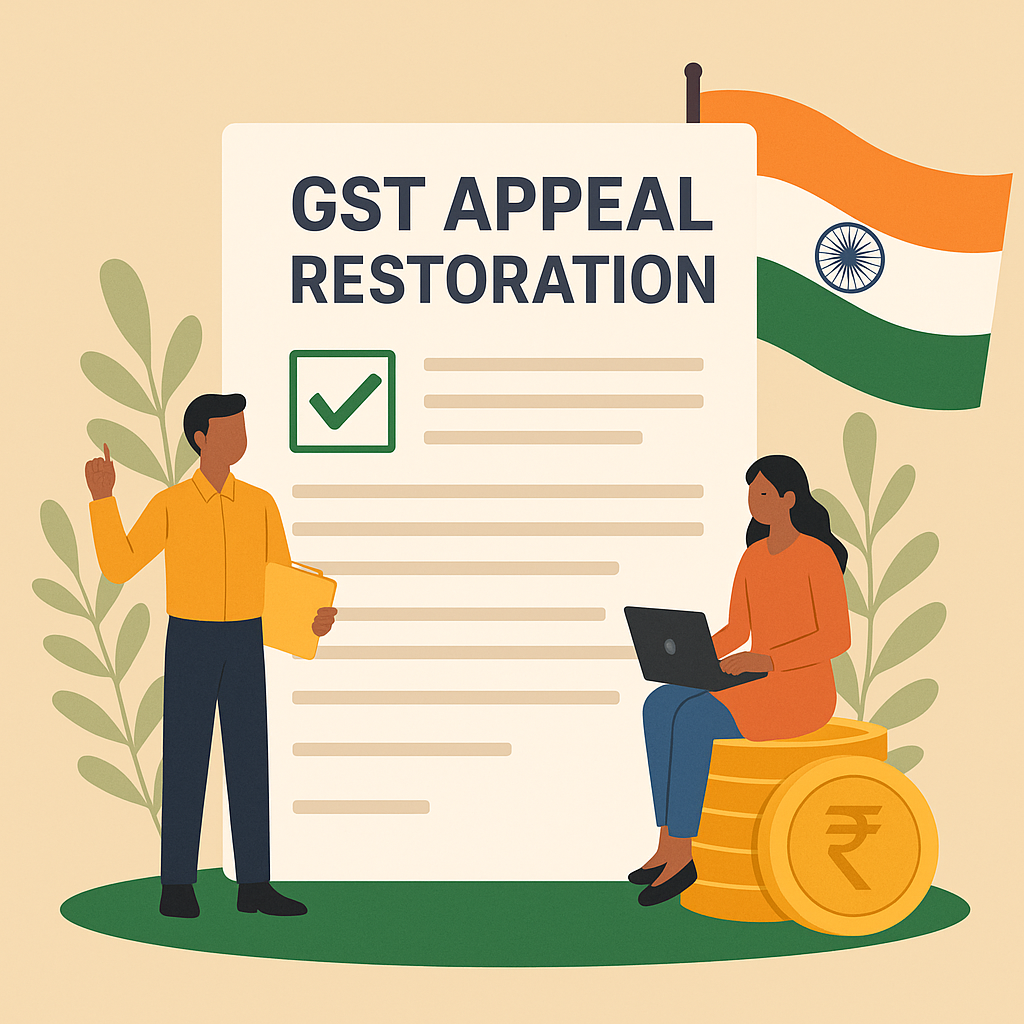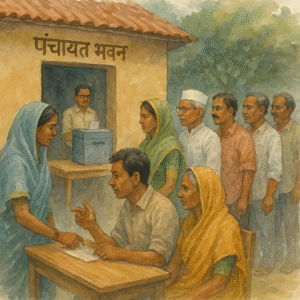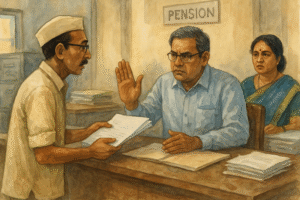The Patna High Court has clarified how delayed appeals under the Bihar GST Act (BGST) can still be heard on merits if a taxpayer complies with the Central Government’s special window created by CBIC Notification No. 53/2023–Central Tax dated 02.11.2023. In this case, the petitioner’s statutory appeal had been rejected as time-barred. The High Court conditionally set aside that rejection and permitted restoration of the appeal, provided the taxpayer fulfills the pre-deposit and procedural requirements under the special notification before the last date of 31.01.2024.
Simplified Explanation of the Judgment
The petitioner (a registered person under BGST) had filed a first appeal against a GST demand order, but the appeal was delayed beyond the statutory time. Under Section 107 of the BGST Act, an appeal must be filed within three months from the date of the order. The law allows an additional one month if sufficient cause for delay is shown. Appeals filed beyond this extended period cannot be entertained either by the Appellate Authority or by the High Court in its writ jurisdiction to condone further delay. In other words, once the statute fixes a hard outer limit, neither the Appellate Authority nor the High Court can go beyond it.
Here, the petitioner’s appeal was beyond even the extra one-month grace period under Section 107(4). Therefore, the Appellate Authority rejected it as time-barred. Ordinarily, that would have closed the door on the merits. However, the Court noted that the Central Board of Indirect Taxes and Customs (CBIC) issued Notification No. 53/2023–Central Tax on 02.11.2023 (S.O. 4767(E)). This notification created a special, time-bound procedure for appeals against orders passed on or before 31.03.2023 under Sections 73 or 74 of the BGST/CGST Acts. It effectively extended the window for filing such appeals, subject to compliance with specified conditions.
Under this special procedure, an eligible person could file an appeal in FORM GST APL-01 on or before 31.01.2024. Appeals already filed and pending before issuance of the notification would be “deemed” to have been filed under the notification, provided the conditions in paragraph 3 are fulfilled. Those conditions require: (a) payment in full of the admitted tax, interest, fine, fee and penalty; and (b) payment of 12.5% of the remaining “disputed tax,” with a cap of ₹25 crore, and with at least 20% of that 12.5% paid from the Electronic Cash Ledger. The notification also states that no refund will be granted till disposal of the appeal in respect of amounts paid in excess of what paragraph 3 requires, that the special window doesn’t apply to demands not involving tax, and that the normal appeals chapter in the GST Rules will apply mutatis mutandis.
Applying these terms to the facts, the High Court held that the petitioner’s appeal—dismissed by the first appellate authority for limitation—should be restored to the file if the petitioner satisfies paragraph 3 of the notification by paying up the “deficient amounts” required to make the appeal maintainable under this special window. The Court clarified what “deficient” means: when an appeal is filed under Section 107, a 10% pre-deposit of the disputed tax would or ought to have been paid. If anything further is required by paragraph 3 of the notification (i.e., up to 12.5% of disputed tax with the stipulated 20% of that paid from the Cash Ledger), the petitioner must make good that shortfall before the cut-off of 31.01.2024.
On that basis, the Court set aside the impugned order dated 15.12.2023 (by which the appeal had been rejected) on the express condition that the petitioner satisfies the notification requirements before 31.01.2024. If the taxpayer complies, the appeal must be taken up and decided on merits; if not, the rejection order would automatically stand restored. The writ petition was allowed in these terms.
In simple terms, the High Court did not “condone” delay beyond what Section 107 allows. Instead, it recognized and enforced a one-time, special statutory mechanism announced by the Central Government for certain past orders under Sections 73/74. This mechanism gives taxpayers a last chance to have their appeals heard, but only if they strictly comply with the deposit conditions and the deadline of 31.01.2024.
Significance or Implication of the Judgment (For general public or government)
For taxpayers, this judgment provides a clear roadmap to rescue appeals dismissed as time-barred, but only in cases covered by the CBIC’s special notification and only if the deposits and timelines are honored. It reminds appellants that pre-deposit requirements are not optional; they are gateway conditions for maintainability. By signposting the exact compliance (admitted dues plus 12.5% of disputed tax, with part of it through the Electronic Cash Ledger) and a strict deadline, the ruling helps avoid confusion and encourages swift corrective action.
For revenue authorities, the judgment balances finality with fairness. It does not dilute the statutory bar on condonation of delay beyond the outer limit in Section 107. Instead, it aligns with the Central Government’s policy decision to open a limited, structured window for appeals relating to past orders under Sections 73 and 74. Authorities are guided to restore and hear such appeals on merits if, and only if, the taxpayer satisfies the notification’s conditions by the cut-off date; otherwise, the original rejection stands.
Legal Issue(s) Decided and the Court’s Decision with reasoning
• Whether a first appellate authority (or the High Court under Article 226) can condone delay beyond the statutory limit in Section 107 BGST.
Decision: No. When a statute fixes an outer limit, neither the appellate authority nor the writ court can condone delay beyond that period.
• Whether a delayed appeal under Sections 73/74 can still be entertained pursuant to CBIC Notification No. 53/2023–Central Tax (02.11.2023).
Decision: Yes, if the appeal is filed on or before 31.01.2024 (or is already pending) and the appellant satisfies the conditions in paragraph 3—payment of admitted dues and 12.5% of disputed tax, with at least 20% of that 12.5% from the Electronic Cash Ledger; the cap of ₹25 crore applies. The appeal should then be taken up on merits.
• Whether the prior rejection order should stand or be set aside.
Decision: The rejection order dated 15.12.2023 is set aside conditionally. If compliance is completed before 31.01.2024, the appeal is restored and heard on merits; otherwise, the rejection automatically revives.
Case Title
Jai Bhagwati Mines v. State of Bihar & Ors.
Case Number
Civil Writ Jurisdiction Case No. 16957 of 2023
Coram and Names of Judges
Hon’ble the Chief Justice (K. Vinod Chandran, CJ) and Hon’ble Mr. Justice Rajiv Roy
Names of Advocates and who they appeared for
For the petitioner: Mr. D.V. Pathy, Advocate
For the respondents (State/Tax Department): Mr. Vikash Kumar, SC-11
Link to Judgment
MTUjMTY5NTcjMjAyMyMxI04=-00ICyWrLGt8=
If you found this explanation helpful and wish to stay informed about how legal developments may affect your rights in Bihar, you may consider following Samvida Law Associates for more updates.








